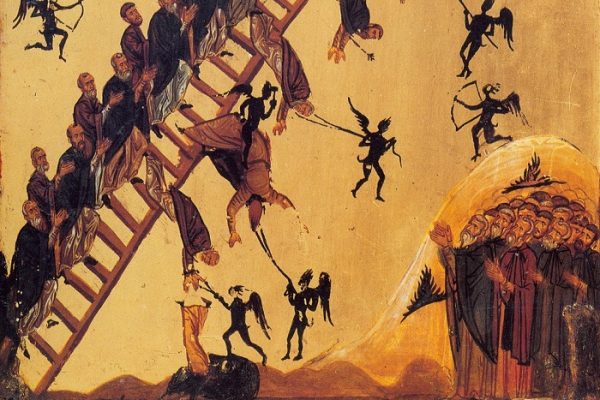The vision of a ladder connecting earth to heaven is found in the story of Jacob in the Book of Genesis (28:12). Jacob, while in a dream, saw a ladder reaching to heaven on which angels were ascending and descending as a sign of divine revelation. In the Gospel of John, Jesus mentions Jacob’s ladder and proclaims that He himself is the fulfillment of Jacob’s dream. “Amen, amen, I say to you, you will see heaven opened and the angels of God ascending and descending upon the Son of Man” (John 1:51). Christ in His person and ministry is the supreme revelation of God’s being and truth in history.
Later Christian thinkers used the metaphor of ladder to speak of Christian life as a spiritual ascent. In the seventh century a man named John, the abbot of the Monastery of St. Catherine at Mt. Sinai, wrote an entire book with the title The Ladder of Divine Ascent featuring thirty steps (for the years of Jesus up to His baptism) by which a Christian could ascend to a life of perfection. John became known as St. John Klimakos (“of the Ladder”). The book is a classic in Christian spirituality.
The fourth Sunday of Great Lent is dedicated to St. John and is known as the Sunday of John Klimakos or John of the Ladder. Although his book is addressed to monastics and speaks of strict monastic disciplines, it also provides words of wisdom for all Christians. The following teachings are taken from John Climacus: The Ladder of Divine Ascent (Paulist Press, 1982) and offered as words for meditation.
*A Christian is an imitator of Christ in thought, word and deed, as far as this is humanly possible, and he believes rightly and blamelessly in the Holy Trinity.
*A friend of God is the one who lives in communion with all that is natural and free from sin and who does not neglect to do what good he can.
*The self-controlled man strives with all his might amidst the trials, the snares and the noise of the world, to be like someone who rises above them.
*How can those who are married and living amid public cares aspire to spiritual life? Do whatever good you can. Speak evil of no one. Rob no one. Tell no lie. Despise no one and carry no hate. Do not separate yourself from the church assemblies. Show compassion to the needy. Do not be a cause of scandal to anyone. Stay away from the bed of another, and be satisfied with what your own spouse can provide you. If you do all this, you will not be far from the kingdom of heaven.
*In everything Christ is our teacher.
*A servant of the Lord stands bodily before men, but spiritually he is knocking at the gates of heaven with prayer.
*Repentance is the renewal of baptism and is a contract with God for a fresh start.
*Do not be surprised if you fall every day and do not surrender. Stand your ground bravely.
*Nothing equals the mercy of God or surpasses it. To despair is therefore to inflict death on oneself.
*You cannot pass a day devoutly unless you think of it as your last. “Remember your last end, and you will never sin” (Wisdom of Sirach 7:13).
*True compunction or piety brings consolation while that which is bogus produces prideful self-esteem.
*The first step toward freedom from anger is to keep the lips silent when the heart is stirred; the next, to keep thoughts silent when the soul is upset; the last, to be totally calm when unclean winds are blowing.
*If the Holy Spirit is peace of soul, then there is no greater obstacle to the presence of the Spirit in us than anger.
*To pass judgment on another is to usurp shamelessly a prerogative of God; and to condemn is to ruin one’s own soul.
*A charitable and sensible mind takes careful note of the virtues it observes in another, while the fool goes looking for faults and defects.
*Talkativeness is a sign of ignorance, a doorway to slander, a leader of jesting. Mindful silence is the mother of prayer, a guard on our thoughts, a journey upwards.
*The beginning of chastity is the refusal to consent to evil thoughts.
*When you hear that your neighbor or your friend has denounced you behind your back or indeed in your presence, show him love and try to compliment him.
*Pride is a denial of God, an invention of the devil, contempt for others, a flight from God’s help, the harbinger of madness.
*If you wish to draw the Lord to you, approach Him as disciple to a master, in all simplicity, openly, honestly, without duplicity, without idle curiosity.
*Humility is forgetfulness of one’s achievements, an awareness that one is weak and helpless, the acknowledgment of divine grace and divine mercy.
*Humility opens the gates of heaven. Just as birds fear the sight of a hawk, those who practice humility fear even the sound of an argument.
*If pride turned some of the angels into demons, then humility can doubtless make angels out of demons; so, take heart, all you sinners.
*Let our God-directed conscience be our aim and rule in everything so that, knowing how the wind is blowing, we may set our sails accordingly.
*Not everyone can achieve complete freedom from evil impulses; but all can be saved and reconciled to God.

















